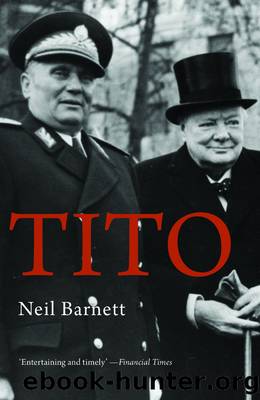Tito by Neil Barnett;

Author:Neil Barnett;
Language: eng
Format: epub
ISBN: 9781913368418
Publisher: Chicago Distribution Center (CDC Presses)
Published: 2022-06-15T00:00:00+00:00
The break with Stalin
Relations with the West and the US cooled off rapidly post-1945 as Churchillâs âIron Curtainâ fell across Europe from Stettin in the Baltic to Trieste in the Adriatic. Stalin set about ordering what he regarded as his new dominions with patchy regard to his wartime agreements with Churchill.
Tito, too, rejected the continued influence of his wartime allies, the British. Indeed, just as during the war, on this and other points he was more Stalinist than Stalin, and Tito started to become a source of irritation to the Soviet leader at a time when he wanted to placate the West. Tito lobbied Moscow, for example, for a faster conversion of central and east European countries to doctrinaire communism. What he failed to grasp, or perhaps accept, was that Stalin intended foreign communists to be vassals, to take orders and not to conduct their own foreign relations, follow radical policies or make âsuggestionsâ to Moscow. Stalin was much happier with countries like Romania and Poland, where communism had been imposed by the Red Army, than with a country that had successfully executed its own revolution.
Domestically, Tito was exceptionally hard-lined. His enthusiasm for imposing collectivisation on the notoriously rebellious peasantry, pursuing industrialisation at breakneck speed and refusal to compromise on doctrine embarrassed Stalin.
Equally, Tito could see that Stalin wanted to control Yugoslaviaâs foreign and domestic policy and to integrate its economic system into the USSRâs through âjoint-stockâ companies, entirely to the latterâs advantage. This operated at the most petty of levels: âAs for films, in 1946 [Moscow] imposed on us a block booking contract ⦠Thus we got Lawrence Olivierâs Hamlet for about two thousand dollars but for Exploits of a Soviet Intelligence Agent we had to pay some twenty thousand dollars.â64
Above all Titoâs regional ambitions most infuriated Stalin, threatening to undermine the USSRâs undertakings at the Treaty of Yalta. Where Stalin wanted docile national leader-bureaucrats who would follow a line devised in Moscow, in Yugoslavia he got a wilful communist zealot bent on regional expansion and Yugoslav interests. After the US bombed Hiroshima and Nagasaki in August 1945, Stalin was militarily vulnerable to the US and could not risk a confrontation. (The USSR only tested its first nuclear bomb in 1949, having devoted massive resources to stealing the technology from the US.)
In April 1945, Yugoslav troops seized the strategically useful Italian port of Trieste at the head of the Adriatic. Under pressure from Stalin, who was keen not to confront the West openly, Tito was forced to hand Trieste to the British. Nevertheless, Trieste remained a source of tension between Yugoslavia and the West. To the south, Tito wanted to back the EAM/ELAS communist guerrillas against the Greek monarchy and the British, in part in the hope of annexing Greek Macedonia and the port of Salon-ika, and even asked the USSR to provide material backing.
Even Austria did not escape Yugoslaviaâs meddling, as Tito believed that British intelligence was protecting remnants of the UstaÅ¡e as a potential counter-revolutionary force to be played back into Yugoslavia.
Download
This site does not store any files on its server. We only index and link to content provided by other sites. Please contact the content providers to delete copyright contents if any and email us, we'll remove relevant links or contents immediately.
Waking Up in Heaven: A True Story of Brokenness, Heaven, and Life Again by McVea Crystal & Tresniowski Alex(37812)
Empire of the Sikhs by Patwant Singh(23086)
We're Going to Need More Wine by Gabrielle Union(19046)
Hans Sturm: A Soldier's Odyssey on the Eastern Front by Gordon Williamson(18592)
Leonardo da Vinci by Walter Isaacson(13336)
The Radium Girls by Kate Moore(12028)
Tools of Titans by Timothy Ferriss(8396)
Educated by Tara Westover(8054)
How to Be a Bawse: A Guide to Conquering Life by Lilly Singh(7486)
Permanent Record by Edward Snowden(5847)
The Last Black Unicorn by Tiffany Haddish(5636)
The Rise and Fall of Senator Joe McCarthy by James Cross Giblin(5280)
Promise Me, Dad by Joe Biden(5154)
The Wind in My Hair by Masih Alinejad(5095)
A Higher Loyalty: Truth, Lies, and Leadership by James Comey(4964)
The Crown by Robert Lacey(4817)
The Iron Duke by The Iron Duke(4356)
Joan of Arc by Mary Gordon(4112)
Stalin by Stephen Kotkin(3968)
